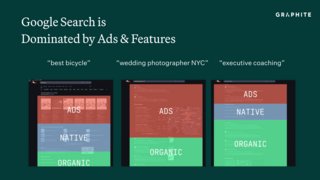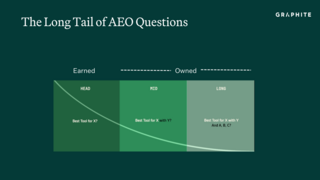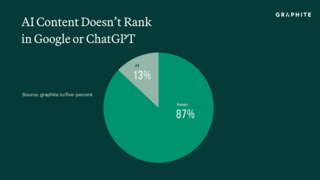Growth Insights| September 2025
AEO Explained: What Growth-Stage Companies Need to Know

For decades, SEO has shaped digital marketing strategy – and today, AEO (Answer Engine Optimization) is reshaping it again. According to the Wall Street Journal, AI chatbots now account for 5.6% of U.S. desktop search traffic – more than double what it was a year earlier. And experts like the folks at Semrush predict that for many topics, AI search visitors will surpass traditional search visitors by 2028.
Answer engines, powered by AI tools like ChatGPT, Gemini, Perplexity, and Claude, are shifting how people discover information and, in turn, how marketers need to think about visibility and customer acquisition.
In our most recent workshop for marketing leaders in the Spectrum Equity portfolio, we invited Ethan Smith, CEO of Graphite and a recognized authority on both SEO and the emerging field of AEO (Graphite recently launched an AEO tool, which you can learn about here). Ethan talked the group through the fundamentals of AI-driven answer engines – sharing how the strategy both differs from and overlaps with traditional SEO.
The insights below are drawn directly from Ethan’s expertise: what AEO is, why it’s important for companies of all sizes, and how to begin incorporating it into your marketing strategy.
What is Answer Engine Optimization?
In simple terms, AEO is about making sure your company appears in AI-powered answer engine results – so if someone’s looking for a solution your product solves, or comparing competitors, you’re favorably mentioned. As with SEO, you can optimize your marketing for this purpose.
In fact, AEO is in some ways an extension of SEO – and relies on many of the same fundamental tactics. The difference is in the delivery system: where search engines serve up a list of results, answer engines summarize search results. They scan the web, find relevant content, and compose an answer. If someone asks “What’s the best [insert your product category here]?” in ChatGPT, the engine will search for that query, gather information from multiple web pages, and then present an answer citing those sources. If your product is mentioned frequently across those sources, you’re more likely to be included in the answer.
So while the goal of SEO is getting your webpage to rank #1, the goal of AEO is to be the most-cited or most-mentioned source for relevant questions. Your “rank” is earned through breadth of presence: being referenced on high-authority sites (more on those later), community forums, and other credible content that answer engines draw from.
Why AEO Matters Now
Answer engines are still outpaced by traditional search engines – as of mid-2025, Google Search had approximately 4.9 billion active users, compared to ChatGPT’s roughly 452 million. But as we all know, AI usage is growing, and a new channel’s “early days” are often the right time to invest. Ethan laid out four compelling reasons marketers should develop an AEO strategy now:
1. AI chatbots are driving real customer signups. AI-powered answer engines are becoming a meaningful source of traffic and customer acquisition. In one case study shared by Ethan, about 8% of a company’s total sign-ups came from LLMs in July of 2025 – up from 0% in July of 2024. And that traffic is converting at a mind-boggling 24%, compared to 4% from SEO traffic.
“Users who come to a website through an answer engine tend to be deep in research mode and ready to act,” said Ethan. “The quality of the traffic is very high.” By the time someone clicks through an AI-generated answer, they’ve essentially been “pre-sold” by the conversational context and are highly primed to engage or convert.
2. The playing field is evolving (and leveling). Where traditional SEO heavily favors websites with established authority – which can take months or years to achieve, especially for more valuable keywords – AEO pulls from a wide array of sources to answer very specific questions, including niche forums, Q&As, and documents that might not rank on page 1 of Google.
“The tail of questions in AEO is larger and less competitive than in traditional SEO,” Ethan explained. “Many highly specific or long-tail questions that people pose in ChatGPT have no equivalent search volume in Google, meaning less competition and a chance for new voices to be included in answers.”
Even relatively new websites can show up in LLM answers if they provide high-quality, relevant information. For growth-stage companies, this represents an opportunity to get in front of potential customers earlier, supplying content for gaps that AI engines need to fill.
3. Chat and search are converging. The distinction between a “search engine” and an “answer engine” is blurring. Ethan pointed out that chat-based engines are beginning to incorporate elements of search (for example, ChatGPT showing product recommendations with links and images, much like Google’s rich results). Likewise, Google is experimenting with more AI-driven answers. To that end, Ethan emphasized that everything you do for SEO (quality content, structured data, etc.) will help with AEO as well. AEO isn’t replacing SEO; it’s building on it.
“For now, organic search remains a huge channel and isn’t going away,” said Ethan. “But AEO is an additive channel and it’s growing fast.”
4. Search engines are dominated by ads and features. On a Google results page, the top organic listings often get squeezed by ads, maps, and other features. Ethan noted that in Google search, your above-the-fold real estate may contain little or no organic results. In contrast, answers from LLMs currently come from 100% organic citations, with no ads injected in the answer text. (Of course, this may change – but it’s also possible that paid subscribers will always get an ad-free experience.) Today, organic visibility through AEO could be even more valuable than a Google snippet, because users see it without the noise of ads.

How AEO Differs from Traditional SEO
While SEO and AEO share the goal of driving organic traffic, Ethan highlighted a few fundamental differences:
Winning the “head” vs “tail” of queries: In traditional SEO, you might focus on ranking highly for a set of relevant, but high-volume keywords (think “best [product] for [use-case]”). In AEO, those high-volume searches (or “head” queries) are answered using multiple sources, which are cited but not ranked.
“In AEO, you win the ‘head’ by getting mentioned in the citations, versus by having your URL show up first,” Ethan explained. That means if you want to be the answer to “best project management tool for small teams,” you’ll need multiple, independent sources mentioning your tool as a top option in reviews, listicles, community recommendations, etc.

Conversely, the “tail” of queries in AEO is huge – people tend to ask questions in very specific, unique-to-their-situation ways. Many of these questions have very low or no search volume on Google, but an answer engine will still tackle them. So the long tail in AEO is not only larger, but often less contested.
Multiple mentions matter more than one ranking page: In SEO, you can win a keyword by publishing one great page on the topic and building its authority. In AEO, your own content alone might not be enough – the AI needs to see your brand or answer echoed across the web. Ethan gave an example with an HR software company, which was cited in answer engines because it was mentioned eight times across different sources that the AI scanned – including partner pages, comparison articles, integration docs, and forum discussions. In short, AEO is a game of ubiquity: you want to be omnipresent wherever relevant conversations or content pieces about your domain exist.
Key AEO Best Practices and Strategies
During the workshop, Ethan shared a wealth of practical advice for marketers who are navigating this new channel. If you (like most of us) are at the beginning of your AEO journey, here are few guiding principles to get you started:
- Balance SEO vs. AEO investment. When asked how to split resources, Ethan recommended allocating 70% of time and energy to SEO, and 30% to AEO. Continue executing on SEO as your core strategy – search is still a very important channel, and much of this work will naturally support AEO. Marketers should also carve out dedicated time and budget for AEO tactics – potentially with a “community manager” type role that can focus on non-traditional channels like Reddit, YouTube, and content partnerships. This person would do things like engage on forums, manage video content, and coordinate with affiliate or PR opportunities (which are not typically in an SEO specialist’s wheelhouse). The bottom line: keep doing what works in SEO, but start investing now in AEO-specific work so you don’t miss the wave.
- Leverage high-authority citations. A major theme of AEO is getting mentioned by credible, authoritative sources. Ethan emphasized that when it comes to AI-generated answers, some domains carry outsized influence. Wikipedia, Reddit, YouTube, and reputable media sites like Business Insider and Forbes (particularly “Best of” lists) show up frequently as cited sources. In practice, this might blur the lines between PR and SEO, but in AEO every quality mention counts. Think of it as building citation equity online – when an LLM is answering a question, you want it to find your name in as many trustworthy places as possible.
- Publish comprehensive, question-focused content. Like SEO, AEO rewards breadth and depth of content. Your website (especially your help center, knowledge base, or blog) should answer as many relevant questions about your product/category as possible. Brainstorm the myriad questions a prospective customer might ask an AI chatbot when evaluating solutions in your space. Then, create content that directly answers those questions. Ethan advised thinking in terms of topics and question clusters – much like SEO topics but for LLM queries. Make use of FAQs, how-to guides, comparison pages, and troubleshooting articles; cross-link these resources so the AI sees a network of information on your domain. The goal is to cover the “long tail” thoroughly. If your content has the best answer to a niche question, an answer engine may surface it – even if your domain authority is low.
- Avoid AI-generated content. You might be tempted to aim for quantity over quality, flooding the long-tail with AI-written articles. But Graphite’s analysis has shown that while the internet is now overflowing with AI-written content, those pieces largely fail to rank or drive meaningful traffic, lacking the originality and authority that both Google and answer engines seek. A few well-crafted pieces (perhaps informed by AI research, but written and edited by experts on your team) will outperform a deluge of generic, surface-level posts.

Final Thoughts: A new channel for high-quality, high-intent traffic
AEO adds another dimension to your marketing playbook – there’s new incentive to explore community-based platforms like Reddit, new long-tail terms to optimize for, and a new opportunity to get in early on a nascent-yet-growing channel. AEO gives marketers – particularly those at growth-stage companies – a chance to leapfrog larger competitors in certain queries, build highly efficient traffic streams, and connect with customers in a more conversational, trust-based way.
The content on this site, including but not limited to blog posts, portfolio news, Spectrum news, and external coverage, is for informational purposes only and does not constitute investment advice. Use of any information presented is at your own risk. Spectrum Equity is not responsible for any content reposted above from any third party website, and has not verified the accuracy of any third party content contained above. Spectrum Equity makes no guarantees or other representations regarding any results that may be obtained from use of this content. Investment decisions should always be made in consultation with a financial advisor and based on individual research and due diligence. Past performance is not indicative of future results, and there is a possibility of loss in connection with an investment in any Spectrum Fund.
Inclusion in any third-party list, award, rating, ranking, or other recognition is not indicative of Spectrum Equity’s future performance and may not be representative of any investor’s experience. To the fullest extent permitted by law, Spectrum Equity disclaims all liability for any inaccuracies, omissions, or reliance on the information, analysis, or opinions presented.